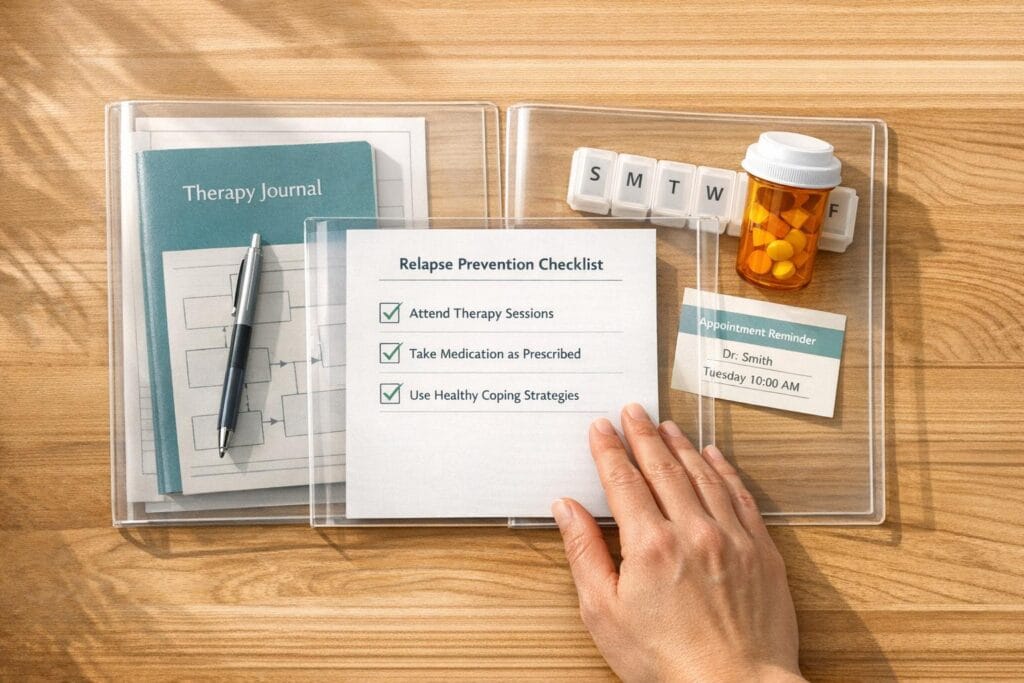Relapse is common but preventable. Studies show that 40% to 60% of people in substance abuse treatment relapse. The key to staying on track? Effective coping strategies. Here’s a quick breakdown of what works:
- Mindfulness: Manage cravings with exercises like mindful breathing or body scans.
- Support Network: Lean on trusted friends, family, or sponsors.
- Stress Management: Incorporate daily activities like deep breathing, walking, or relaxation routines.
- Healthy Habits: Prioritize sleep, exercise, hydration, and balanced meals.
- Recovery Plan: Identify triggers, structure your day, and plan emergency steps.
- Avoid Risky Situations: Steer clear of environments or people tied to substance use.
- Emotional Management: Use journaling, counseling, or support groups to process feelings.
- Continuous Learning: Build recovery skills with workshops, reading, and group meetings.
Quick Tip: Use the HALT method to address warning signs – Hungry, Angry, Lonely, Tired. Recognizing these early can prevent a lapse or relapse.
Preventing relapse is about preparation, awareness, and consistent effort. These strategies can help you build resilience and maintain long-term sobriety.
What Causes Relapse
Defining Relapse
Relapse refers to returning to substance use after a period of sobriety. It’s not just a single moment but often a gradual process. Dr. Steven Melemis breaks this process into three stages:
- Emotional: Mood swings, isolation, and bottled-up feelings.
- Mental: Struggling with cravings and thoughts of using.
- Physical: Actually consuming the substance again.
It’s important to differentiate between a lapse and a full relapse. A lapse is a one-time occurrence, what addiction expert G. Alan Marlatt, Ph.D., calls an "abstinence violation." This doesn’t necessarily mean treatment has failed. Understanding this distinction is crucial to identifying and addressing relapse triggers.
Common Relapse Triggers
Triggers for relapse typically fall into two main categories:
- External Triggers:
- Visiting places tied to past substance use.
- Attending social events where substances are present.
- Reconnecting with old companions who used substances.
- Seeing drug-related items or paraphernalia.
- Internal Triggers:
- Chronic stress, emotional pain, loneliness, or mood disorders.
Recognizing these triggers early can help in managing them effectively and reducing the risk of relapse.
Warning Signs to Watch For
Spotting warning signs early is key to preventing relapse. The HALT method is a helpful tool for identifying risks:
| Warning Sign | What It Means | What To Do |
|---|---|---|
| Hungry | Neglecting basic physical needs | Stick to regular meals. |
| Angry | Unresolved emotional struggles | Practice stress-relief techniques. |
| Lonely | Feeling isolated or disconnected | Reach out to supportive people. |
| Tired | Experiencing exhaustion | Focus on getting enough rest. |
Other signs to keep an eye on include:
- Struggling with post-acute withdrawal symptoms like insomnia.
- Slipping back into old, unhealthy habits.
- Increased irritability or frustration.
Being aware of these signs allows for timely action, reinforcing the coping strategies discussed in this guide. Recognizing and addressing these indicators helps support a long-term recovery.
10 Coping Skills for Addiction and Recovery | Applied Care …
8 Ways to Prevent Relapse
Here are eight effective strategies to help maintain sobriety and reduce the risk of relapse.
Practice Mindfulness
Mindfulness can help you acknowledge cravings without acting on them. Studies suggest it can lower relapse rates when combined with treatment.
Try these mindfulness exercises:
- Mindful Breathing: Spend 5 minutes focusing on your breath, gradually increasing the time.
- Body Scan: Dedicate 10 minutes to noticing sensations in different parts of your body.
- Thought Observation: Observe your thoughts without judgment, letting them come and go naturally.
Create a Support Network
A reliable support system can be a lifeline during challenging moments. Keep an emergency contact list of trusted individuals, such as:
- A sponsor from groups like Alcoholics Anonymous (AA) or Narcotics Anonymous (NA)
- Sober friends who can offer immediate help
- Family members who support your recovery
- Professional counselors or therapists
Save this list on your phone and carry a copy in your wallet for quick access.
Manage Daily Stress
Stress can be a major trigger for relapse, so managing it is key. Incorporate stress-relief activities into your daily schedule:
| Time of Day | Activity | Duration |
|---|---|---|
| Morning | Deep breathing | 5–10 minutes |
| Afternoon | Walk or movement break | 15–20 minutes |
| Evening | Relaxation routine | 20–30 minutes |
Build Better Health Habits
Healthy routines can strengthen your recovery. Focus on:
- Getting 7–9 hours of sleep each night
- Exercising for at least 30 minutes daily
- Eating balanced meals at consistent times
- Staying hydrated throughout the day
Make a Recovery Plan
A written recovery plan can guide you through difficult moments. Include:
- Identifying Triggers: Write down your triggers and coping strategies, and review them often.
- Daily Structure: Plan your day with meals, exercise, and support group meetings.
- Emergency Steps: Outline actions to take during intense cravings or emotional distress.
This plan can help you stay grounded and prepared.
Avoid Risky Situations
Stick to environments and people that support your recovery. Avoid:
- Places tied to past substance use
- Social gatherings where substances are present
- People who encourage old habits
- Stressful situations without adequate support
Handle Difficult Emotions
Instead of turning to substances, process challenging emotions in healthy ways:
- Keep a journal to track your feelings
- Regularly check in with your support network
- Seek professional counseling when needed
Keep Building Recovery Skills
Expand your recovery toolkit by:
- Attending weekly support meetings
- Joining recovery workshops
- Reading helpful literature
- Practicing and refining coping strategies
The more skills you develop, the better equipped you’ll be to handle challenges and stay on track.
sbb-itb-17645e5
Tools for Recovery Success
Use these daily tools to support your recovery journey. They work well alongside your coping strategies and overall recovery plan.
Daily Recovery Journal
Start your day by jotting down:
- How you’re feeling
- Any triggers you noticed
- Actions you plan to take to cope
- One key goal for the day
Recovery Toolkit Essentials
Incorporate these focused sessions into your day to reinforce your recovery strategies:
| Time of Day | Tool | Purpose | Duration |
|---|---|---|---|
| Morning | Mindful Check-in | Build emotional awareness | 10 minutes |
| Mid-day | Stress Relief Break | Manage triggers | 15–20 minutes |
| Evening | Recovery Reading | Strengthen skills | 20–30 minutes |
| Before Bed | Gratitude Practice | Promote emotional balance | 5–10 minutes |
If your usual routine feels insufficient, have emergency tools ready to use.
Emergency Response Plan
Keep these resources on hand for challenging moments:
- Crisis Contact List
Save a list of supportive contacts in your phone under "Recovery Support." Include counselors, sponsors, and trusted friends who understand your situation. - Grounding Techniques
Use these methods to manage intense cravings:- 5-4-3-2-1 sensory awareness exercise
- Deep breathing (4-7-8 technique)
- Progressive muscle relaxation
Self-Care Implementation
Build self-care into your routine by focusing on:
- Physical health: Aim for 30 minutes of exercise daily.
- Emotional well-being: Journal or meditate every day.
- Social connection: Attend a weekly support group.
- Personal development: Join a monthly workshop to learn new skills.
Stress Management Tools
Incorporate these stress-relief practices into your day:
- Morning: Meditation or mindful breathing
- Midday: Take a walk in nature or do some light stretching
- Evening: Wind down with relaxation techniques
Progress Tracking System
Monitor your progress by keeping track of:
- Days of sobriety
- Triggers encountered and how you responded
- Weekly wellness activities completed
- Monthly recovery goals achieved
Tracking these metrics helps you stay on course and strengthens relapse prevention efforts.
Comparing Coping Methods
Different coping strategies can address various challenges during recovery. The chart below, along with real-life examples, shows how and when to use each method effectively.
Strategy Comparison Chart
| Coping Method | Best For | Effectiveness | Challenges | When to Use |
|---|---|---|---|---|
| Mindfulness | Managing cravings and anxiety | High for immediate stress | Requires practice and patience | During intense emotions or cravings |
| Support Network | Combating isolation and building accountability | Very high for long-term success | Takes time to build trust | Regular check-ins |
| Daily Stress Management | Preventing a buildup of triggers | Moderate to high | Needs consistent practice | Throughout each day |
| Health Habits | Building physical resilience | High for overall wellness | Requires lifestyle changes | Daily self-care routines |
| Recovery Planning | Preventing impulsive decisions | High for crisis prevention | Needs regular updates | Before facing potential triggers |
| Risk Avoidance | Protecting against high-risk situations | Very effective short-term | May limit some activities | In situations with elevated risk |
| Emotional Management | Processing difficult feelings | High for sustained recovery | Takes time to master | During emotional upheaval |
| Continuous Learning | Building long-term growth | Builds over time | Requires ongoing commitment | Weekly skill building |
Real-life experiences emphasize how these strategies work in practice. For example, avoidance strategies are particularly helpful for dealing with external triggers, such as places tied to past behaviors.
"I’ve learned to avoid obvious triggers like walking down the liquor aisle at the grocery store."
On the other hand, internal triggers like stress or loneliness often call for active coping methods, such as contrary action.
"What I want to do is go sit at home alone, but what I do instead is go to a meeting because even though I don’t feel like going, I know it always makes me feel better."
The HALT method is a quick way to decide which coping strategy to use:
- Hungry or Tired → Focus on health habits and self-care.
- Angry → Use mindfulness and emotional management techniques.
- Lonely → Reach out to your support network.
Combining strategies often leads to better outcomes.
"The best thing I can do for myself is to help someone else. It’s a chain reaction of compassion that can help everyone – that’s the essence of recovery."
Recovery isn’t one-size-fits-all. Tailor your approach by matching specific triggers to the right strategies. For example, mindfulness may require practice to yield long-term benefits, while risk avoidance offers immediate protection but works best when paired with other methods. A well-rounded toolkit can address both immediate needs and long-term recovery goals.
Conclusion
Preventing relapse requires a consistent and well-rounded approach. The eight coping skills discussed here are designed to help build the resilience necessary for long-term recovery. Studies show that practicing these strategies daily – rather than only in moments of crisis – makes them far more effective. Habits like mindfulness meditation and maintaining strong support networks can create a solid base for ongoing recovery.
"Relapse prevention skills are essential to learning to live a happy life in recovery." – addictioncenter.com
Techniques such as the HALT assessment and mindfulness meditation improve self-awareness, helping you recognize and address warning signs early on. This proactive approach can stop small issues from growing into bigger obstacles.
A healthy routine that includes exercise, nutritious meals, and adequate sleep, combined with emotional and social support, serves as a strong shield against relapse triggers. Having a variety of tools at your disposal ensures you’re prepared to handle different challenges as they arise.
Recovery is a continuous process of growth and self-discovery. Each skill you develop strengthens your ability to maintain sobriety. Building these habits consistently provides a strong foundation for a lasting recovery. If you need additional support, seeking professional guidance can further solidify your journey to sustained sobriety.
FAQs
How can I use mindfulness daily to help prevent relapse?
Incorporating mindfulness into your daily routine can be a powerful tool to prevent relapse. Mindfulness helps you stay present and manage stress, which are key factors in maintaining sobriety. Here are a few practical ways to get started:
- Practice meditation: Dedicate a few minutes each day to focus on your breath or a calming mantra. This can help reduce cravings and improve emotional regulation.
- Stay present in the moment: Throughout your day, take brief pauses to notice your surroundings, sensations, or thoughts without judgment. This builds awareness and reduces impulsive behaviors.
- Use mindfulness techniques for triggers: When faced with cravings or stress, try grounding exercises like deep breathing or focusing on five things you can see, hear, or feel.
By making mindfulness a regular part of your life, you can strengthen your ability to navigate challenges and maintain your recovery journey.
How can I build a strong support network to stay on track with my recovery?
Building a strong support network is essential for maintaining recovery. Start by reaching out to trusted individuals in your life, such as family members, close friends, or a therapist, who can provide encouragement and understanding. Consider joining local recovery groups or online communities where you can connect with others who share similar experiences.
Take small, manageable steps to expand your network without overwhelming yourself. For example, attend a recovery meeting, participate in group activities, or simply have regular check-ins with someone you trust. Supporting others in their recovery journey can also create meaningful connections and reinforce your own commitment to sobriety.
Remember, a strong support system is built on mutual trust, open communication, and shared goals. Surround yourself with people who encourage your progress and celebrate your successes, no matter how small.
How can I recognize and handle my triggers to avoid relapse?
Identifying and managing personal triggers is key to preventing relapse. Start by reflecting on your internal triggers, such as stress, anxiety, loneliness, or negative self-talk. Then consider your external triggers, like specific people, places, or situations that remind you of past substance use.
Once you’ve identified these triggers, create a plan to address them. This might include practicing mindfulness to manage emotions, avoiding high-risk environments, or reaching out to a trusted support system when needed. Building awareness of your triggers and having strategies in place can help you stay on track in your recovery journey.


